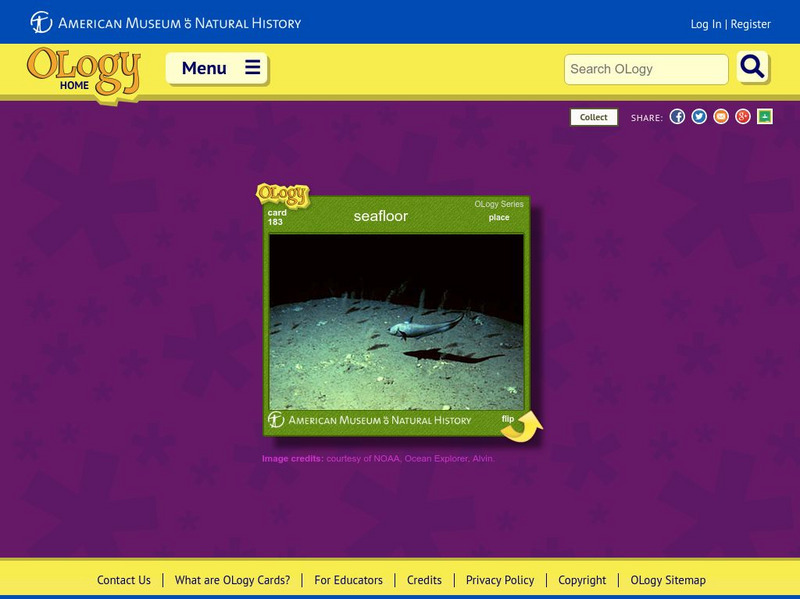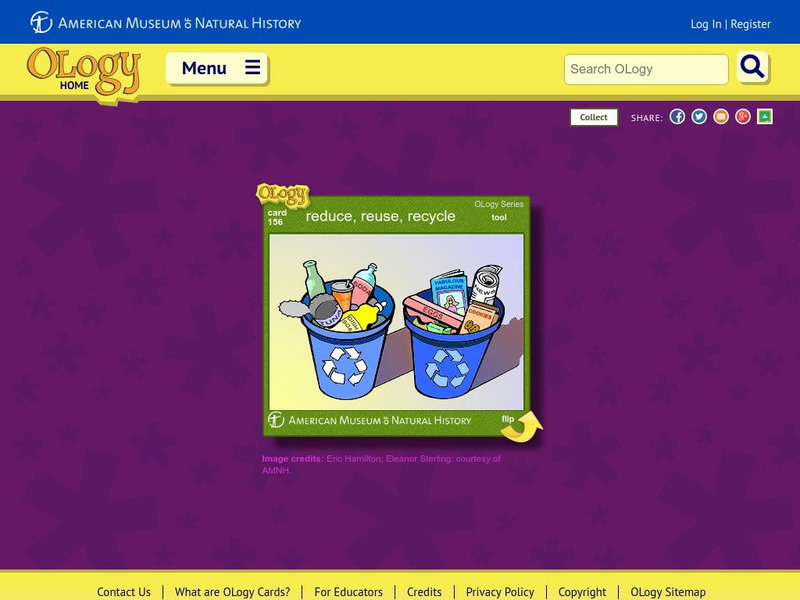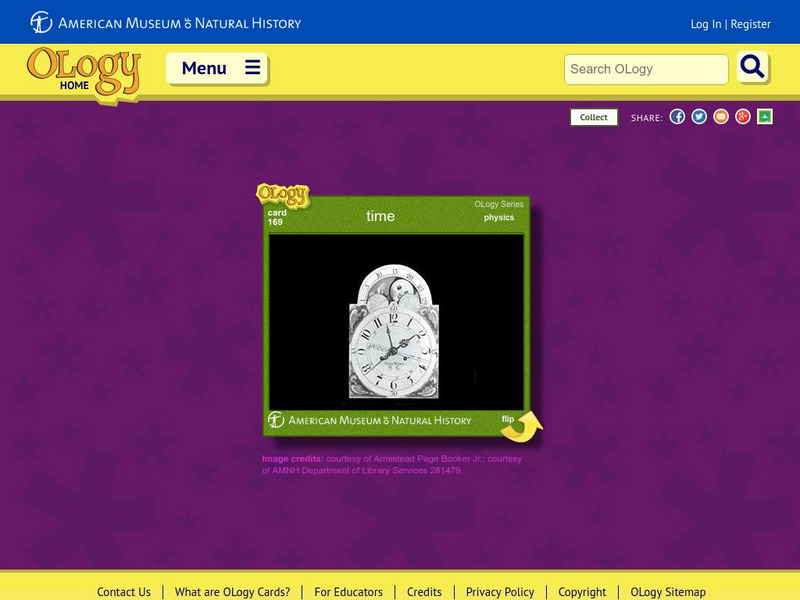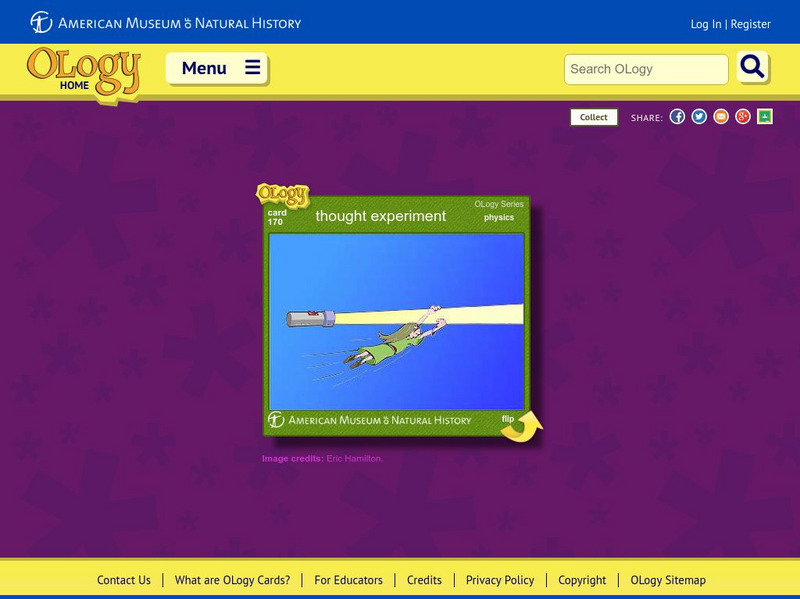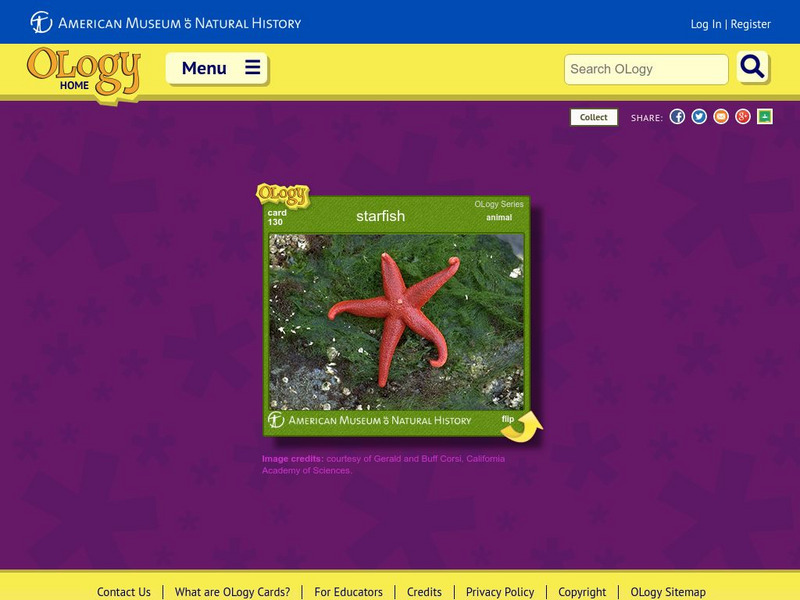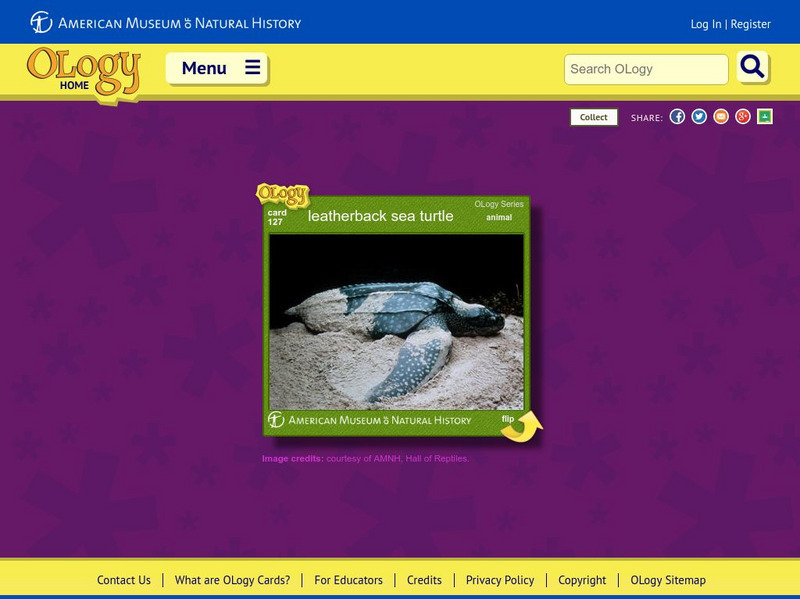Hi, what do you want to do?
American Museum of Natural History
American Museum of Natural History: Giant Tubeworms O Logy Card
Flip over this interactive OLogy card to find fast facts, questions and answers, and similar bite-size pieces of information the giant tubeworm.
American Museum of Natural History
American Museum of Natural History: Goliath Frog O Logy Card
Flip this interactive OLogy card to find a definition, fast facts, questions and answers, and other bite-size pieces of information about the Goliath frog.
American Museum of Natural History
American Museum of Natural History: Seismosaurus O Logy Card
Flip over this interactive card to find fast facts, questions and answers, and other bite-size pieces of information about seismosaurus.
American Museum of Natural History
American Museum of Natural History: Seafloor O Logy Card
Learn about the seafloor and the creatures that live there by turning over this interactive OLogy card. Find questions and answers, fast facts, and similar bite-size pieces of information on the subject.
American Museum of Natural History
American Museum of Natural History: Sea Otter O Logy Card
Flip over this interactive OLogy card and start learning bite-size pieces of useful information about the sea otter.
American Museum of Natural History
American Museum of Natural History: Reduce, Reuse, and Recycle O Logy Card
Turn over this interactive OLogy card and start learning bite-size pieces of useful information about reducing, reusing, and recycling.
American Museum of Natural History
American Museum of Natural History: Radiated Tortoise O Logy Card
Flip this interactive OLogy card to find fast facts, questions and answers, and other bite-size pieces of information about the radiated tortoise.
American Museum of Natural History
American Museum of Natural History: Pseudoscorpions O Logy Card
Flip this interactive OLogy card to find fast facts, questions and answers, and other bite-size pieces of information about pseudoscorpions.
American Museum of Natural History
American Museum of Natural History: Glowing in the Ocean
This site focuses on underwater animals that create their own light using bioluminescence. It also provides the lyrics and audio of a catchy tune putting bioluminescence in the spotlight.
American Museum of Natural History
American Museum of Natural History: Time O Logy Card
Flip over this interactive OLogy card to find short overviews, fact-or-fiction questions, and similar bite-size bits of information about the nature of time, time travel, atomic clocks, and the general theory of relativity.
American Museum of Natural History
American Museum of Natural History: Tibetan Antelope O Logy Card
Flip this interactive OLogy card and start learning bite-size pieces of useful information about the Tibetan antelope, such as its habitat, diet, size, and characteristics.
American Museum of Natural History
American Museum of Natural History: Thought Experiment O Logy Card
Learn what thought experiments are and the role they play in furthering scientific thinking by turning over this interactive OLogy card. Find questions and answers, fast facts, and similar bite-size pieces of information.
American Museum of Natural History
American Museum of Natural History: Termites O Logy Card
Turn over this interactive OLogy card to find fast facts, questions and answers, and similar bite-size pieces of information to help you understand termites.
American Museum of Natural History
American Museum of Natural History: Tarbosaurus O Logy Card
Flip over this interactive card to find fast facts, questions and answers, and other bite-size pieces of information about tarbosaurus.
American Museum of Natural History
American Museum of Natural History: Starfish O Logy Card
Flip over this interactive OLogy card to find fast facts, questions and answers, and other bite-size pieces of information about starfish.
American Museum of Natural History
American Museum of Natural History: Whooping Crane O Logy Card
Flip this interactive card to find fast facts, questions and answers, and other bite-size pieces of information about the whooping crane.
American Museum of Natural History
American Museum of Natural History: White Tailed Spider O Logy Card
Turn over this interactive card and start learning bite-size pieces of useful information about the white-tailed spider, such as their diet and physical characteristics.
American Museum of Natural History
American Museum of Natural History: What Is a Clone? O Logy Card
Flip this interactive card to find questions and answers, fast facts, and other bite-size pieces of information to help you understand cloning.
American Museum of Natural History
American Museum of Natural History: West Indian Manatee O Logy Card
Flip over this interactive OLogy card to learn about West Indian manatees, answer questions about them, and uncover fascinating manatee facts. Card also includes an all-in-one view of key data about West Indian manatees, such as their...
American Museum of Natural History
American Museum of Natural History: Mites O Logy Card
Turn over this interactive OLogy card and start learning bite-size pieces of useful information about the mite, such as its habitat, diet, and size.
American Museum of Natural History
American Museum of Natural History: Marie Curie O Logy Card
Flip this interactive OLogy card to find fast facts, questions and answers, and other bite-size pieces of information about Marie Curie.
American Museum of Natural History
American Museum of Natural History: Metamorphic Rock O Logy Card
How are metamorphic rocks formed? What are examples of metamorphic rock? Flip over this interactive OLogy Card to find the answers to these and similar questions about metamorphic rock.
American Museum of Natural History
American Museum of Natural History: Leatherback Sea Turtle O Logy Card
Flip this interactive OLogy card to learn about the leatherback sea turtle. Find fast facts, questions and answers, and other bite-size pieces of information.
American Museum of Natural History
American Museum of Natural History: Ladybird Beetle O Logy Card
Flip this interactive OLogy card to find fast facts, questions and answers, and other bite-size pieces of information about the ladybird beetle, also known as a ladybug.








